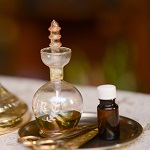When and Why to Use Anointing Oils from Israel

The Bible refers to the use of "Holy" anointing oils for acts of worship, as a symbolic representation of our faith, for consecration and dedication and for laying on of hands in prayer for healing and deliverance.
Nowadays, anointing oils also are used as a perfume for hygiene purposes, funeral or embalming practices or to prepare weapons for war.
What are anointing oils?
Anointing oil is an unguent—or ointment—that is made from just oil or flowers, fragrant herbs, gums, resins, seeds, spices and other botanicals can be added. Instead of the sweet perfume fragrance of today, these oils had distinct, aromatic odors, such as herbal, earthy, medicinal, balsamic, spicy or sweet.
Nowhere in Scripture commands or suggests that we should use similar oil today but neither is there anything that forbids it.
When and why you should use anointing oils from Israel
Frankincense: In temple days, sweet incense containing Frankincense was placed on the Inner Altar of the Tabernacle and burned morning and evening. Used as a burial spice and in purification rites, it was a primary ingredient of the Holy Anointing Oil. It speaks of suffering and death.
Myrrh (Prayer Oil): This exotic biblical spice was used in purification and beautification rites and in burial spices. Bitter to the taste but sweet to the smell, myrrh in the spiritual sense speaks of dying to self to become a "sweet smelling savor" to the Lord.
Spikenard (Prayer Oil): A rare and costly fragrant oil, was used by Mary of Bethany to anoint the head and feet of the Messiah two days before His death, as recorded in John 12:3: “Then Mary took a pound of ointment of spikenard, very costly, and anointed the feet of Jesus, and wiped His feet with her hair: and the house was filled with the odor of the ointment.” It speaks of the bride’s extravagant adoration and intimacy with the groom, in total abandonment. It is referred to as "The Fragrance of the Bride" because it symbolizes the bride, who has made herself ready.
Cassia: One of the principal spices of the Holy Anointing oil used to anoint priests, kings and their garments isn't used much today. In the spiritual sense, cassia speaks of humility, being stripped of pride, set apart (holy) with a servant's heart.
Cedars of Lebanon: This huge evergreen tree exudes a gum-like resin that produces the highly aromatic oils. It speaks of strength, permanence, wholeness and restoration.
Henna: Widely used as a cosmetic from ancient times until present, it is a popular dye that is applied in intricate patterns on the hands and feet of brides. The alluring fragrance is thought to be the source of Cleopatra's famous captivating perfume. The root word for henna is derived from an Arabic word meaning emotional tenderness.
Ketubah (Prayer Oil): This Hebrew word meaning "It is written" and the name given to marriage contracts for the children of Israel outlining the vows and responsibilities of the groom and the bride toward each other. It is a special aromatic blending and prophetic union of certain biblical fragrances representing the participants in the holy covenant of marriage: the groom, the bride and the Spirit of the Living God.
Rose of Sharon (Prayer Oil): This fragrance is best described as "tea-rose;" a not-too-sweet, light, floral scent, that isn't overpowering. This flower is actually not a rose but part of the hibiscus family. Its blooms are nonetheless beautiful and glorious, just as Isaiah depicted the Bride of Messiah would be when she shines in all the radiance of her heavenly glory and beauty.
Pomegranate (Prayer Oil—The Blessings of the Lord): A Persian native, it is one of the oldest fruits known to man and was highly esteemed by the Israelites. An enormous number of petals must be pressed and steam-distilled in order to make a quantity of oil. Once pressed, it gives off a pleasant and slightly fruity odor. Jewish tradition teaches that the pomegranate symbolizes righteousness because it is said to have 613 seeds, which correspond with the 613 mitzvot or commandments of the Torah. It speaks of God's favor exhibited in fruitfulness and abundance.
We trust you will find our products to be of the highest quality. We pray that each item will be a blessing to all who buy, give and receive.

